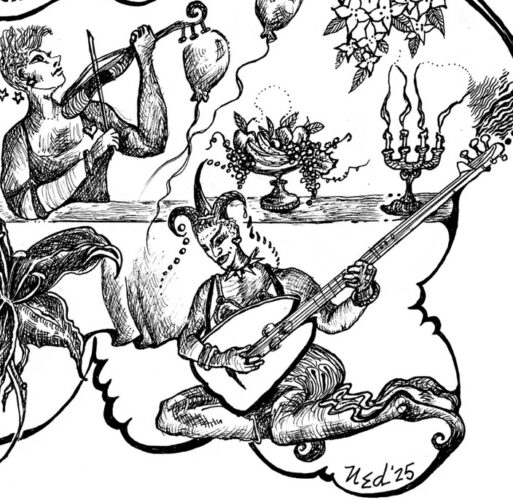by Anne Timberlake
Published June 17, 2024
By structure, size, and length, summer workshops provide opportunities that are tough to come by the rest of the year. ‘Among the best experiences an adult musician can have.’
‘It’s like drinking from a firehose. You get exposure to everything.’
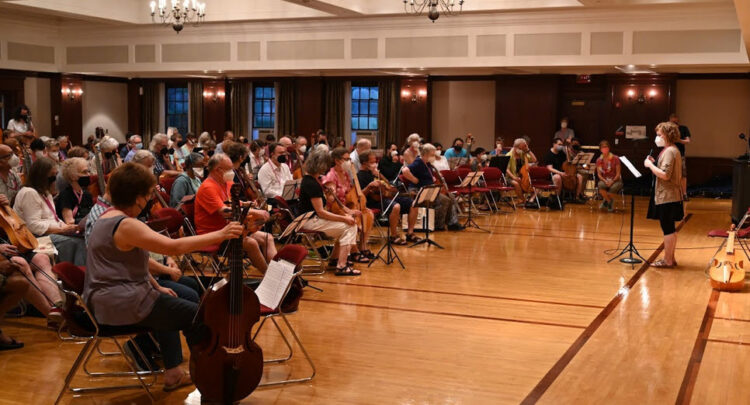
Have you ever wondered what it would sound like if you got two alpenhorns together and then added a lyzard and some shawms?
If you’ve attended a summer early-music workshop, this question might not be rhetorical.
“It was amazing,” reports David Lawrence, who played the lyzard in this unusual after-hours pickup band at Mountain Collegium in North Carolina. His wife, Barbara Stark, played one of the alpenhorns. Lawrence and Stark, who live in Austin, Tex., are dedicated early-music workshop attendees. Except during the pandemic, they’ve attended at least two workshops each year since 2013.
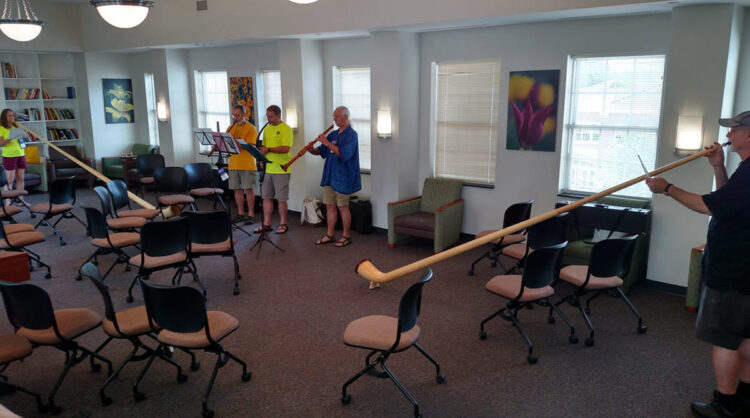
“It makes you a better musician,” asserts Lawrence. “Everyone should go. The workshops are fun, and the people that you meet are friendships that will last a lifetime.”
Stark agrees, though admits she is not a fan of one aspect of Mountain Collegium’s yearly workshop. “I avoid the garklein choir,” she tells me about the eardrum-piercing sopranissimo recorder session. “I sit up on the balcony with a drink and laugh at you all.”
As a multi-year veteran of the garklein choir, I concede she may have a point. Nevertheless, my earplugs are packed and ready to go!
At this point in my teaching career, the summer season has a familiar rhythm. For some workshops, I’m on faculty every summer. Other workshops I rotate through. I enjoy them all, and I can’t imagine my year without these weeks devoted to learning and growing with students and colleagues.
If you can’t decide if these workshops are for you, ask yourself a fundamental question. Some people are happy playing music by themselves. In fact, they might prefer it — you can hear yourself play, there are no other personalities to contend with and, if you get lost, it doesn’t matter. Others savor the interweaving of different parts. They love harmony and interplay and relish the shared joy of making music together.
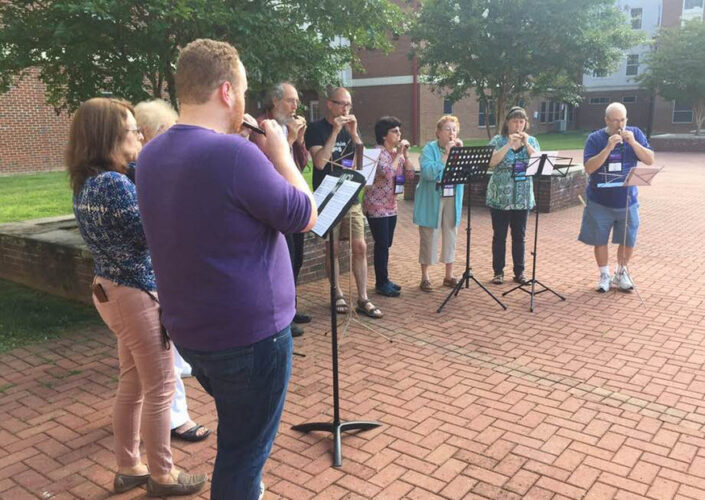
It’s this second category of people who tend to do well at workshops. That’s because workshops are all about making music in community. Here, even if you’re playing alone, you’re typically playing for others, and more often than not you’re playing with them as well.
But if you’re new to the summer workshop world, you might be wondering what’s in it for you. Why carve out a whole week of your life to attend? Is a summer workshop worth the time, travel, and cost? What do you get out of the experience?
Well, it depends on whom you ask.
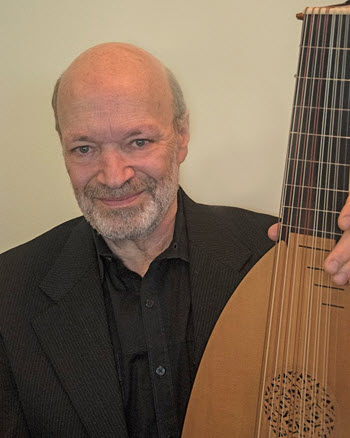
“It’s the after-hours playing,” says Zoe Tokar, a viol and recorder player from Oregon who has attended multiple workshops including the Viola da Gamba Society of America’s Conclave, San Francisco Early Music Society workshops, and Oberlin’s Baroque Performance Institute. “You can do it for hours and hours. You just start at the beginning and you read through a whole consort book.” (From the EMA archive: read a detailed report from VdGSA’s Conclave, from 2022.)
Lutenist and regular Lute Fest attendee Bill Thatcher, from Tennessee, cites the caliber of the faculty offered at the Lute Society of America’s annual workshop. “To actually sit in a masterclass, or take a lesson with someone who has a deep understanding of the music, to hear them play just a few feet away from you — what a sound!”
Workshops are invaluable for the diversity of musical experiences, contends recorder player Linda Rising, also from Tennessee, who has been attending them for 50 years. “The different teachers, the different people, the different instruments — more variety and more challenge.”
‘To sit in a masterclass, or take a lesson with someone who has a deep understanding of the music, to hear them play just a few feet away from you — what a sound!’
I agree with all of these answers. Thanks to their structure, size, and length, summer workshops provide opportunities that are tough to come by during the rest of the year.
Workshop playing can motivate you to expand your skills like nothing else. It forces you to practice things like sight reading, following your line amidst conflicting inputs, and listening and playing at the same time. It can inspire you to pick up a new type or size of instrument, or work to improve your tuning. In sum, it will stretch you in ways that would be difficult, if not impossible, to achieve on your own.
Or, in the words of Philadelphia-based recorder teacher Gwyn Roberts, ”they are among the best experiences an adult musician can have.”
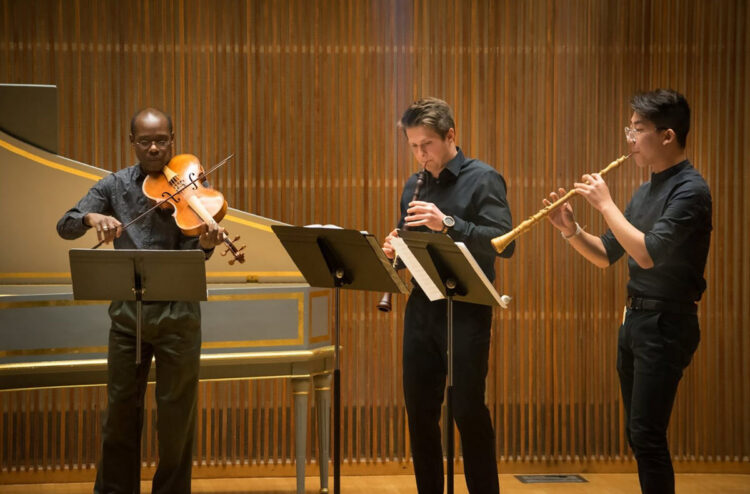
Here’s a sampling of what they offer:
Perspective: No matter how much you love your local teacher, there are limits to each person’s knowledge, abilities, and time. Summer workshops offer a broad slate of faculty — drawing nationally and even internationally — and interacting with this diversity of teachers can open you up to new ways of thinking and playing.
“I come home with so many new ideas to put into my daily practice,” says recorder player Monica Boruch, who lives in Washington, D.C. and has attended the Amherst Early Music Festival and Mountain Collegium. (Read EMA’s detailed report on the Amherst and Oberlin festivals, from 2022)
David Lawrence, the lyzard fan, concurs: “It gives you a chance to work with a bunch of different instructors, and you want to get influences from a bunch of different people [to] find what works for you, technique-wise.”
I reliably find that my own private students benefit from this broader exposure. Sometimes another teacher will say something in a slightly different way, sparking a moment of insight. Sometimes a student just needs to hear something said in more than one teacher’s voice. Often, my students return inspired and eager to work.
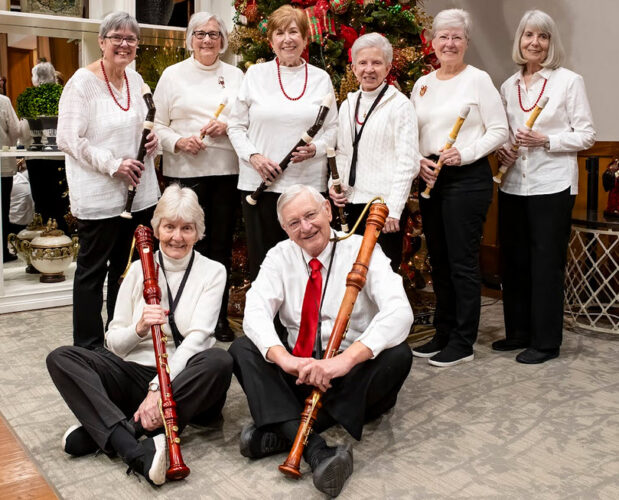
Breadth: Do you dream of a class devoted entirely to the hurdy gurdy? Are you keen to try out krumhorn or play with a harpsichordist? How about a class devoted to music for bass recorders? Summer workshops, with their large student and faculty pools, are the place to do this.
“It’s like drinking from a firehose,” says Bill Thatcher. He explains that the lute has 400 years of history. At Lute Fest, there might be a late Medieval class on plectrum lute, a class on 16th-century lute, a continuo class, instruction on Baroque lute or guitar or theorbo or vihuela, all within the same week. “You get exposure to everything.”
Recorder player Linda Rising notes the mental benefits of trying new things: “Research in cognitive science tells us that if we do the same things over and over again, we are not learning and growing. It doesn’t matter how old you are, you have to have something different.”
As Barbara Stark advises, “Be fearless! Go out there, try new things. This is about expanding your brain and keeping it active as you age.”
Still, with all the activity and high spirits at these workshops — drinking from that firehose — it’s important to pace yourself. “You don’t have to do everything. You have the option of not taking all four classes. You have the option of not playing in the evening,” says Rising.
“Be kind and gentle with yourself, and take breaks,” says Amy Pennington. “It can be overwhelming and exhausting, and you should feel free to do what you need to do in order to make the most of the experience for yourself — whatever that looks like for you.”
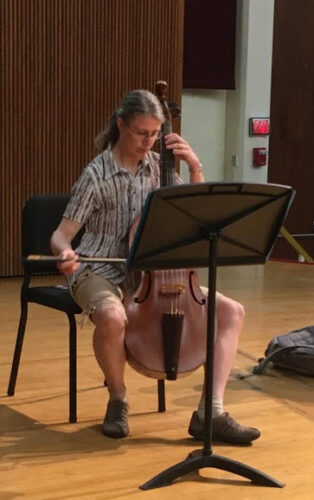
Depth: During a shorter workshop, it’s simply not possible to delve deeply into techniques, repertoire, or concepts. Summer workshops tend to be longer, somewhere around a week, and this allows you more time to deepen your understanding, build skills, and reinforce new habits.
“There is a shared enthusiasm and excitement that builds over the period of the week,” says Monica Boruch. “Bonding for a week with other musicians is so rewarding and you are all there for the same reason.”
Lawrence marvels at how much he learned during his first year attending Indiana University’s Early Double Reed and Sackbut workshop. “When I first got there, I didn’t know what a third was. By the end of the week, you’re working in modes, solemnizing pieces, you’re transposing, reading from different clefs, playing from manuscript — a real brain workout.”
In this often fast-paced learning environment, Karl Rehmer notes that, “When people give you a criticism, they are trying to help. Sometimes it may hit you in a way that doesn’t particularly make you happy. But they’re not trying to make you unhappy. They’re trying to help you. That’s what they’re there for.”
Time: For those of us who might have commitments outside of playing the recorder, the most precious gift that summer workshops offer is time. Think about how you spend each day working, cooking, cleaning, caretaking, commuting, and so on. Now sweep all of that away and replace it with large blocks of time devoted to making music. What’s not to like?
“You can put all your daily worries and responsibilities aside,” says Zoe Tokar, who, in her day-to-day life, juggles a veterinary practice with dog agility classes, musical endeavors, gardening, and household tasks.
Newer workshop attendee Amy Pennington, who balances a full-time job as a librarian with side gigs as a professional violist, says she relishes the chance to focus. “I get to get away from home and my day job for a bit to focus on something for me.” Plus, as Boruch notes, “you don’t have to wash any dishes.”
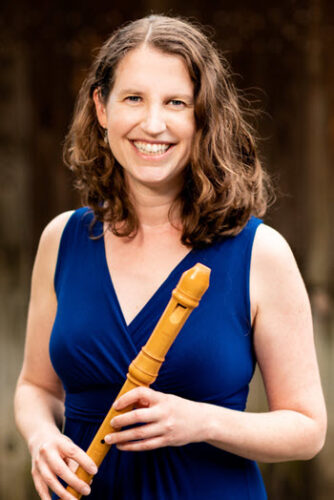
Connection: There are many reasons to attend summer workshops, but one refrain I hear over and over, from students and teachers alike, is how wonderful it is to be able to connect with other lovers of early music. Summer workshops draw regionally, nationally, and sometimes even internationally, so you’re able to make connections with other players outside your local sphere. Lawrence describes it as “family that you only see once or twice a year.”
“Community building and friendship are a huge part of it,” notes Tokar. “It’s a hoot to be around other nerdy early-music types.” And it’s not just socializing: Peer-to-peer learning at workshops is real and invaluable. Maybe you’ve always wanted to try out a particular model of instrument, or talk to someone who has put together a school concert.
Lawrence praises the supportive environment: “You’re never going to find a more forgiving community, because everyone’s been there, and everyone is still learning.”
Indeed, we are!
Here are a few resources to get started on early-music summer workshop participation:
EMA’s list of workshops: https://www.earlymusicamerica.org/annual-festival-workshop-list/
Scholarships: Cost can be a barrier when it comes to attending a workshop. If you’d like to attend a workshop but struggle with the financial demands, there are various organizations with scholarship help:
Viola da Gamba Society of America
Individual workshops may also offer scholarships, and the majority offer participants (of all ages) the option to complete work-study tasks in exchange for a reduced rate.
Anne Timberlake has performed widely across the U.S. and is a founding member of the ensemble Wayward Sisters, specializing in music of the early Baroque. She has coached through Indiana University’s Pre-College Recorder Program, the San Francisco Early Music Society, the Amherst Early Music Festival, Virginia Baroque Performance Academy, Mountain Collegium, Mideast, Pinewoods Early Music Week, and for numerous American Recorder Society chapters.


